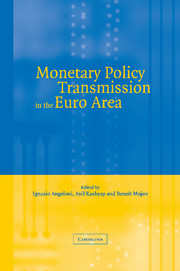 Monetary Policy Transmission in the Euro Area
Monetary Policy Transmission in the Euro Area Published online by Cambridge University Press: 22 September 2009
Introduction
This chapter attempts to analyse the strength of the credit channel using a data set of Austrian firms. In Austria the issuance of equities and bonds has played a minor role in the external financing of firms, while relationships with other firms and the house bank principle have been the dominant financing strategy. Owing to their importance in the financial structure of Austrian firms, trade credit and the house bank principle merit a detailed analysis of their role in the transmission mechanism. While evidence is still mixed the majority of studies have found that the use of trade credit weakens the credit channel. The hypothesis is that if firms face lower loan supply, they may be able to circumvent such a credit squeeze through trade credit. Studies that analyse the role of bank-lending relationships have found that if banks do not reduce their supply of loans even when the monetary stance changes, because of a long-term relationship, then the credit channel will also be weaker but the interest rate channel does not necessarily become weaker.
Following the methodology of the accompanying studies in this volume, the approach used here is to include the firm's specific user cost of capital and the liquidity ratio in a neo-classical investment demand equation. The distributional effects on investment are first studied by splitting the sample according to size and age. In a second step the sensitivity of investment to its components is made dependent on the firm's access to funds.
To save this book to your Kindle, first ensure [email protected] is added to your Approved Personal Document E-mail List under your Personal Document Settings on the Manage Your Content and Devices page of your Amazon account. Then enter the ‘name’ part of your Kindle email address below. Find out more about saving to your Kindle.
Note you can select to save to either the @free.kindle.com or @kindle.com variations. ‘@free.kindle.com’ emails are free but can only be saved to your device when it is connected to wi-fi. ‘@kindle.com’ emails can be delivered even when you are not connected to wi-fi, but note that service fees apply.
Find out more about the Kindle Personal Document Service.
To save content items to your account, please confirm that you agree to abide by our usage policies. If this is the first time you use this feature, you will be asked to authorise Cambridge Core to connect with your account. Find out more about saving content to Dropbox.
To save content items to your account, please confirm that you agree to abide by our usage policies. If this is the first time you use this feature, you will be asked to authorise Cambridge Core to connect with your account. Find out more about saving content to Google Drive.